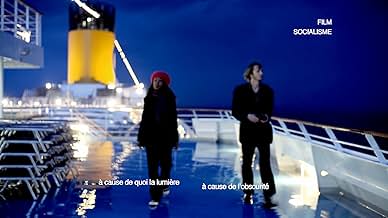PUNTUACIÓN EN IMDb
5,7/10
3 mil
TU PUNTUACIÓN
Añade un argumento en tu idiomaThe passengers on a Mediterranean cruise enjoy their luxuries as a small family struggles with overbearing media attention.The passengers on a Mediterranean cruise enjoy their luxuries as a small family struggles with overbearing media attention.The passengers on a Mediterranean cruise enjoy their luxuries as a small family struggles with overbearing media attention.
- Dirección
- Guión
- Reparto principal
- Premios
- 5 premios y 2 nominaciones en total
Agatha Couture
- Alissa (segment "Des choses comme ça")
- (as A. Couture)
Mathias Domahidy
- Mathias (segment "Des choses comme ça")
- (as M. Domahidy)
Quentin Grosset
- Ludovic (segment "Des choses comme ça")
- (as Q. Grosset)
Maurice Sarfati
- (segment "Des choses comme ça")
- (as M. Sarfati)
Nadège Beausson-Diagne
- Constance (segment "Des choses comme ça")
- (as N. Beausson)
Dominique Devals
- (segment "Des choses comme ça")
- (as D. Devals)
Marine Battaggia
- Florine "Flo" Martin (segment "Quo vadis Europa")
- (as M. Battaggia)
Reseñas destacadas
Far to be a Godard admirer, I was real seduced by this film, a mix of cultural references about Mediteranean area, a good pledge for language as obstacle of understanding, eccentric, innovative, absurd in essence, proposing characters and theirs memories and believes , but not exactly a story.
A film about time and masks and past and facts as pieces of puzzle , it is a provocative invitation to viewer to create his explanations or - and doubts.
For me, the old watch is the main scene defining this film who remains a clash by fragments of doczmentary, stains of kitsch and rediscover of past. All, in essence, in the most honest manner.
A film about time and masks and past and facts as pieces of puzzle , it is a provocative invitation to viewer to create his explanations or - and doubts.
For me, the old watch is the main scene defining this film who remains a clash by fragments of doczmentary, stains of kitsch and rediscover of past. All, in essence, in the most honest manner.
I'll admit that I've only seen a handful of Jean-Luc Godard's movies. "Film socialisme" is the latest. Very bizarre movie. In fact, it doesn't really emphasize a plot. It's hard to tell what the movie's emphasis is supposed to be, with the focus on a group of people aboard a cruise ship in the Mediterranean. Maybe Godard wanted to address the use of certain places as tourist meccas, but I couldn't be certain. With current events in the world, it's probably significant that the movie includes Palestine.
I'd like to see the rest of Godard's movies, but I doubt that I'll ever be able to truly understand what sort of point he was trying to make with this one.
Watch for singer-songwriter Patti Smith in a brief appearance.
I'd like to see the rest of Godard's movies, but I doubt that I'll ever be able to truly understand what sort of point he was trying to make with this one.
Watch for singer-songwriter Patti Smith in a brief appearance.
We recently screened Godard's contentious "Film Socialisme" at a small art-house cinema in Boulder, CO where I live and I couldn't be more delighted by the response. Namely, there were many people who were infuriated about the film, leaving in droves and upset that such a film both exists and/or would be shown at said theater (the only art-house theater in the city, actually).
One patron was even angry enough to leave a note behind for the concessions stand stating that she "speaks French" and was particularly upset about the subtitles of the film. She'd probably be the kind of person to get upset about the "punctuation problems" in ee cummings' poems. And don't get her started on Andy Kaufman!
First and foremost, "Film Socialisme" is without a doubt a beautiful film. The way in which it was shot and edited is visionary, a true patchwork of modern/post-modern society/cinema today. The kind of film that -- as with the majority of Godard's ouevre -- may be ahead of its time but will certainly be enjoyed by sincere cinephiles looking for something new, bold and fresh. Beyond any sense of provocation, there were true moments of visual/audio splendor that simply cannot be seen anywhere else (by sheer merit of the fact that, yes I agree, no one else would be "allowed" to make/distribute such a film; and that in itself is important when considering whether or not you should spend the money/time on seeing it in the theater).
Clearly, the subtitles of the film -- which are minimalist and fractured (clearly intentionally) - - are a play on one of the film's many themes: the breakdown of communication and language (think Gertrude Stein texting you viz. her thoughts on modern society). That people are growing angry about the challenging and innovative way Godard has aptly chosen to play even now with the very subtitles of his film is extremely exciting. Not to mention the fact that, again, aside from the "gimmick," the subtitles become a poetic innovation unto themselves in which Godard combines words into fascinating portmanteaus that invoke clever wordplay a la some of the greater avant-garde/surrealist literature.
He has finally gone that extra distance in deconstructing every aspect of the film (including, at times, a brilliant dalliance with the audio mix that clearly has confounded viewers a la similar experiments by the likes of the Velvet Underground, Andy Warhol, Andy Kaufman and La Monte Young; there are moments in which you truly wonder whether or not there is an "actual" breakdown of the film being shown -- especially if you're lucky enough to see this film through digital projection; "Is there something wrong with the disc?! Oh no!!" Very exciting. Audience interaction, indeed!)
Ultimately and as per Godard's typical (?) MO, the film is a firm lashing of the perpetuated bourgeois culture (particularly in America; hence his giving us the finger for not knowing French or the many other languages interspersed throughout the polyglot film; "You don't want to learn another language? Fine. Try figuring THIS out!!")
Like Lenny Bruce and a younger John Waters, with "Film Socialisme" Godard is shaking up audience members -- particularly his "greatest fans" -- by provoking them in ways they may not be comfortable with, in ways that may simply repel them. "You want to be shocked? I'll shock you, but be prepared to be, well c'mon: shocked." We don't go to Godard films to watch a clear narrative or to understand everything that happens. It's poetry, it's visual/audio artistry, it's -- ultimately -- play and experimentation. And Godard has once again succeeded in creating something that will not allow us to remain static in our seats. If you can't handle that, he is saying as always, then feel free to leave and don't forget to ask for a refund on your way out.
The megaplex is right down the street. Or, hey, buy a copy of "Breathless" and watch a nice "really weird and wild!!!!" noir film with a plot. It's all up to you!
In the end, the film defies quotation marks. If you want "challenging," you've got plenty of it on Netflix. If you want challenging, however, see "Film Socialisme." Just don't be too upset if it... challenges you.
One patron was even angry enough to leave a note behind for the concessions stand stating that she "speaks French" and was particularly upset about the subtitles of the film. She'd probably be the kind of person to get upset about the "punctuation problems" in ee cummings' poems. And don't get her started on Andy Kaufman!
First and foremost, "Film Socialisme" is without a doubt a beautiful film. The way in which it was shot and edited is visionary, a true patchwork of modern/post-modern society/cinema today. The kind of film that -- as with the majority of Godard's ouevre -- may be ahead of its time but will certainly be enjoyed by sincere cinephiles looking for something new, bold and fresh. Beyond any sense of provocation, there were true moments of visual/audio splendor that simply cannot be seen anywhere else (by sheer merit of the fact that, yes I agree, no one else would be "allowed" to make/distribute such a film; and that in itself is important when considering whether or not you should spend the money/time on seeing it in the theater).
Clearly, the subtitles of the film -- which are minimalist and fractured (clearly intentionally) - - are a play on one of the film's many themes: the breakdown of communication and language (think Gertrude Stein texting you viz. her thoughts on modern society). That people are growing angry about the challenging and innovative way Godard has aptly chosen to play even now with the very subtitles of his film is extremely exciting. Not to mention the fact that, again, aside from the "gimmick," the subtitles become a poetic innovation unto themselves in which Godard combines words into fascinating portmanteaus that invoke clever wordplay a la some of the greater avant-garde/surrealist literature.
He has finally gone that extra distance in deconstructing every aspect of the film (including, at times, a brilliant dalliance with the audio mix that clearly has confounded viewers a la similar experiments by the likes of the Velvet Underground, Andy Warhol, Andy Kaufman and La Monte Young; there are moments in which you truly wonder whether or not there is an "actual" breakdown of the film being shown -- especially if you're lucky enough to see this film through digital projection; "Is there something wrong with the disc?! Oh no!!" Very exciting. Audience interaction, indeed!)
Ultimately and as per Godard's typical (?) MO, the film is a firm lashing of the perpetuated bourgeois culture (particularly in America; hence his giving us the finger for not knowing French or the many other languages interspersed throughout the polyglot film; "You don't want to learn another language? Fine. Try figuring THIS out!!")
Like Lenny Bruce and a younger John Waters, with "Film Socialisme" Godard is shaking up audience members -- particularly his "greatest fans" -- by provoking them in ways they may not be comfortable with, in ways that may simply repel them. "You want to be shocked? I'll shock you, but be prepared to be, well c'mon: shocked." We don't go to Godard films to watch a clear narrative or to understand everything that happens. It's poetry, it's visual/audio artistry, it's -- ultimately -- play and experimentation. And Godard has once again succeeded in creating something that will not allow us to remain static in our seats. If you can't handle that, he is saying as always, then feel free to leave and don't forget to ask for a refund on your way out.
The megaplex is right down the street. Or, hey, buy a copy of "Breathless" and watch a nice "really weird and wild!!!!" noir film with a plot. It's all up to you!
In the end, the film defies quotation marks. If you want "challenging," you've got plenty of it on Netflix. If you want challenging, however, see "Film Socialisme." Just don't be too upset if it... challenges you.
A Jean-Luc Godard double feature for me this evening. The first was Alphaville. This film, reported to be Godard's last, is a far cry from that.
It was shot entirely in digital, and the colors are breathtaking. It was meant to be seen in the theater, according to Godard, but I had to settle for video. There are numerous technical "glitches" in the film, and they were meant to be there.
Most of the film's text is in French with a smattering of German, Russian, Arabic, Hebrew, Latin, and Greek. Godard added subtitles in what he termed "Navajo English" at the bottom of the frame, which were as unhelpful as they were meant to be. The film is about a failure to communicate.
This is one of those films where the critics are far more enamored than the general populace. It is considered one of the top films of 2011 - almost the top ten. The people would disagree.
It was shot entirely in digital, and the colors are breathtaking. It was meant to be seen in the theater, according to Godard, but I had to settle for video. There are numerous technical "glitches" in the film, and they were meant to be there.
Most of the film's text is in French with a smattering of German, Russian, Arabic, Hebrew, Latin, and Greek. Godard added subtitles in what he termed "Navajo English" at the bottom of the frame, which were as unhelpful as they were meant to be. The film is about a failure to communicate.
This is one of those films where the critics are far more enamored than the general populace. It is considered one of the top films of 2011 - almost the top ten. The people would disagree.
Godard seemed to always be concerned with the pretension of language being inadequate to convey meaning, which is stated more clearly in the title of his 2014 film, Goodbye to Language. Not only does he suggest language is a poor mediator of meaning (in a fashion so incoherent that you have to figure this out from second hand accounts in many cases... or from longterm fanboyism), but he makes sure you won't get any meaning out of the film by making it inscrutable and fractured. There is little to cling to. Characters come and go, nameless ones, who fail to be more than ghostly stereotypes that function as many different mouthpieces for Godard.
There are political references, mentions of Stalin, Hitler, other dictators, communists, events related to WWII or occurring just before or after it, colonialism, etc... Some of the references are obscure, some quite well known, but they're all thrown around in an incoherent jumble. Never much more than a bunch of ideas that one can mostly only guess about.Most ideas remain too undeveloped to be interesting or garner much though from the viewer. It's mostly just name dropping and references. His films took a turn for an essayistic style—essentially essay films, barraging an audience with many ideas, skits, monologues, visuals, poems, sounds, music, etc. in a sometimes pleasing medley—he could convey so much, often doing so with considerable panache, but it seems to me that he's becoming less coherent and fails to be interesting in his experiments it's all so detached. Early iterations of his style had a semblance of narrative to run the ideas through or developed mouthpieces that could be more easily identified as a sign of something. He's gone too far into the excesses of postmodernism and has failed to craft an engaging piece of cinema. No, this is more like unfunny (okay so sometimes it is funny: "Go invade another country," says a rude girl when pressed for an answer by tourists—oh, and this is while she's reading Balzac, which is revealed with a camera zoom, followed by random shots of a llama and disconnected shards of dialogue) comedy vignettes than cinema. Godard actually comes off as a bit of a memelord here—the man always was with the times the hyperactive nature and strange soundbites lend it that kind of quality, not to mention the cat video that Alissa watches (accompanied by her obnoxious imitation "meow."
The chronology of the movie seems to be Part 1: Godard goes on a cruise with his rich friends. Part 2: Godard films in his backyard and focuses on a family. Part 3: Archival footage that mercifully does away with all the annoying characters
Many images do not work very well with the spoken word, and one might argue: that is the point. The actors don't really act—they're there to be mouthpieces, even more so than many older Godard movies. They're little more than a source being cited in a paper. Actor's often speak in a loopy French sing-song poetic style, which contradicts the rather prosaic lines often spoken, not to mention the chopped up mess that are the subtitles of this film—Navajo English, which is one of Godard's jokes for translating the french into English and cutting out words on a whim to make less sense than he usually makes.
Compared to his old work with Raoul Cotard, the cinematography is rather ugly at many points. He uses many different digital cameras—from webcams to professional cinema cameras. There are digital artifacts and he tends to heavily oversaturate the colors in certain scenes to the point where the images look warped. Some shots look lovely but there's no real rhyme or reason to it, no consistency. Random canted angles of random things happening on the cruise ship, for example—random montages, etc.
One example of a scene would be the year 1936 being referenced. Following that, a woman on screen has a monologue about Moscow's and other countries involvement in the Spanish Civil War. Matryoshka dolls are sitting around her in the foreground. She is arguing with a person, and the movement of gold out of the Spanish bank is a key topic. Some other woman, unseen in the background, begins to babble something unrelated, some of it while the first woman is still talking. A male character approaches the first woman, ruffles her hair, and name drops a communist, then walks away... that's what most of the movie is like, only less interesting.
Godard is just some elitist who expects everyone to learn his language, not like language is an effective means of expression, according to him, the absurdist. Luckily the DVD has full English subs, not that it makes a lot of sense most of the time, anyway.
There are political references, mentions of Stalin, Hitler, other dictators, communists, events related to WWII or occurring just before or after it, colonialism, etc... Some of the references are obscure, some quite well known, but they're all thrown around in an incoherent jumble. Never much more than a bunch of ideas that one can mostly only guess about.Most ideas remain too undeveloped to be interesting or garner much though from the viewer. It's mostly just name dropping and references. His films took a turn for an essayistic style—essentially essay films, barraging an audience with many ideas, skits, monologues, visuals, poems, sounds, music, etc. in a sometimes pleasing medley—he could convey so much, often doing so with considerable panache, but it seems to me that he's becoming less coherent and fails to be interesting in his experiments it's all so detached. Early iterations of his style had a semblance of narrative to run the ideas through or developed mouthpieces that could be more easily identified as a sign of something. He's gone too far into the excesses of postmodernism and has failed to craft an engaging piece of cinema. No, this is more like unfunny (okay so sometimes it is funny: "Go invade another country," says a rude girl when pressed for an answer by tourists—oh, and this is while she's reading Balzac, which is revealed with a camera zoom, followed by random shots of a llama and disconnected shards of dialogue) comedy vignettes than cinema. Godard actually comes off as a bit of a memelord here—the man always was with the times the hyperactive nature and strange soundbites lend it that kind of quality, not to mention the cat video that Alissa watches (accompanied by her obnoxious imitation "meow."
The chronology of the movie seems to be Part 1: Godard goes on a cruise with his rich friends. Part 2: Godard films in his backyard and focuses on a family. Part 3: Archival footage that mercifully does away with all the annoying characters
Many images do not work very well with the spoken word, and one might argue: that is the point. The actors don't really act—they're there to be mouthpieces, even more so than many older Godard movies. They're little more than a source being cited in a paper. Actor's often speak in a loopy French sing-song poetic style, which contradicts the rather prosaic lines often spoken, not to mention the chopped up mess that are the subtitles of this film—Navajo English, which is one of Godard's jokes for translating the french into English and cutting out words on a whim to make less sense than he usually makes.
Compared to his old work with Raoul Cotard, the cinematography is rather ugly at many points. He uses many different digital cameras—from webcams to professional cinema cameras. There are digital artifacts and he tends to heavily oversaturate the colors in certain scenes to the point where the images look warped. Some shots look lovely but there's no real rhyme or reason to it, no consistency. Random canted angles of random things happening on the cruise ship, for example—random montages, etc.
One example of a scene would be the year 1936 being referenced. Following that, a woman on screen has a monologue about Moscow's and other countries involvement in the Spanish Civil War. Matryoshka dolls are sitting around her in the foreground. She is arguing with a person, and the movement of gold out of the Spanish bank is a key topic. Some other woman, unseen in the background, begins to babble something unrelated, some of it while the first woman is still talking. A male character approaches the first woman, ruffles her hair, and name drops a communist, then walks away... that's what most of the movie is like, only less interesting.
Godard is just some elitist who expects everyone to learn his language, not like language is an effective means of expression, according to him, the absurdist. Luckily the DVD has full English subs, not that it makes a lot of sense most of the time, anyway.
¿Sabías que...?
- CuriosidadesThe film did not include traditional English language subtitles for releases in countries that spoke such language. Instead, the subtitles were in "Navajo English", a translation that baffled many critics and audience members.
- PifiasSomeone claims that Napoleon founded the Comédie-Française in 1812 in Moscow. Actually, it was founded in 1680 by Louis XIV.
- Citas
Rebecca (segment "Des choses comme ça"): [dialogue continuity] You're absolutely right: I don't love any "people." Not French, not North American, not German. Not Jewish people, not black people. I love only my friends... When there are any.
- ConexionesEdited from El acorazado Potemkin (1925)
- Banda sonoraMamita mia
Performed by Ernst Busch
Selecciones populares
Inicia sesión para calificar y añadir a tu lista para recibir recomendaciones personalizadas
- How long is Film socialisme?Con tecnología de Alexa
Detalles
- Fecha de lanzamiento
- Países de origen
- Sitio oficial
- Idiomas
- Títulos en diferentes países
- Film Socialism
- Localizaciones del rodaje
- Empresas productoras
- Ver más compañías en los créditos en IMDbPro
Taquilla
- Recaudación en Estados Unidos y Canadá
- 42.925 US$
- Fin de semana de estreno en EE. UU. y Canadá
- 4526 US$
- 5 jun 2011
- Recaudación en todo el mundo
- 222.079 US$
Contribuir a esta página
Sugerir un cambio o añadir el contenido que falta

Principal laguna de datos
By what name was Film socialisme (2010) officially released in India in English?
Responde























